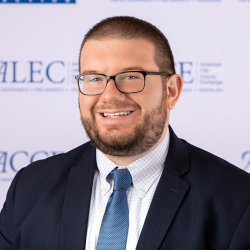Posted by Elena del Valle on July 25, 2022

Thomas Savidge, research manager, Center for State Fiscal Reform at American Legislative Exchange Council
Photo, report: American Legislative Exchange Council
A podcast interview with Thomas Savidge, research manager, Center for State Fiscal Reform at American Legislative Exchange Council (ALEC), is available in the Podcast Section of Hispanic Marketing and Public Relations, HispanicMPR.com. During the podcast, he discusses unfunded public pension liabilities in the 50 States (see ALEC 2021 35-page report on state pension funds: Unaccountable and Unaffordable) with Elena del Valle, host of the HispanicMPR.com podcast.
Tom researches and writes on state tax and fiscal policy, applying knowledge learned in the classroom and working in the policy world.
To listen to the interview, scroll down and click on the play button below. It is also possible to listen by looking for “Podcast” then select “HMPR Thomas Savidge” and download the MP3 file to your audio player. You can also find it on the RSS feed. To download it, click on the arrow of the recording you wish to copy and save it to disk. The podcast will remain listed in the July 2022 section of the podcast archive.
Posted by Elena del Valle on July 20, 2022

New U.S.P.S. mariachi stamps
Photos: United States Postal Service
The United States Postal Service (U.S.P.S.) released a new stamp design of mariachis last week. It printed 18 million stamps, the usual average number for a stamp printing, according to a U.S.P.S. spokesperson. Rafael López, a Mexican illustrator who created official posters for the Obama campaign to target Latino voters, was contracted to do the artwork for the stamps.
When asked who selected the theme for the stamps Bill Gicker, director, Stamp Services, U.S.P.S. replied via an intermediary by email, “Subject matter for stamps is evaluated and selected by the Citizens’ Stamp Advisory Committee. The final decision for issuing a stamp resides with the Postmaster General of the United States.”
“Numbers are determined by like sales of past issuances,” he said. “Commemorative stamps are intended to be available for about a year.”

Rafael López designed the new stamps.
When asked what criteria was used to select the artist he replied, “The USPS works with contract art directors who determine the best way to portray particular subjects. They are always on the search new artists, designers and photographers. We have worked with Raphael in the past and the art directed felt his style and experience would be a good selection for this project.”
Regarding the budget for the project overall he said, “There are no specific budgets for stamp projects, but artists receive a standard $5,000 per design for each stamp design.”
“The USPS receives about 30,000 subject submissions per year, but does not accept art submissions,” he said when asked how many art submissions they receive a year.
According to his biography López was commissioned to create twelve United States Postal Stamps including the series of five Mariachi stamps featuring musicians dressed in the traje de charro, playing guitar, guitarrón, vihuela, violin and trumpet. According to his website the illustrator lives and works in San Diego and at his home studio in San Miguel de Allende, Mexico. The U.S.P.S. had worked with him in the past.
Posted by Elena del Valle on July 11, 2022

Mathieu Champigny, group chief executive officer, CoCreativ
Photo: CoCreativ
A podcast interview with Mathieu Champigny, group chief executive officer, CoCreativ, is available in the Podcast Section of Hispanic Marketing and Public Relations, HispanicMPR.com. During the podcast, he discusses brand versus product messaging with Elena del Valle, host of the HispanicMPR.com podcast.
Mathieu has held a number of high tech and creative management positions in Europe and the United States over the past 20 years. In his current role he leads Industrial Color, Globaledit and Smashbox Studios servicing brands in creative production solutions. Before managing this creative group of agencies, his career started in structured finance in Paris, France followed by Houston, Texas.
To listen to the interview, scroll down and click on the play button below. You can listen by looking for “Podcast” then select “HMPR Mathieu Champigny” and download the MP3 file to your audio player. You can also find it on the RSS feed. To download it, click on the arrow of the recording you wish to copy and save it to disk. The podcast will remain listed in the July 2022 section of the podcast archive.
Posted by Elena del Valle on June 20, 2022

Jackie Lange, CEO, Panama Relocation Tours
Photo: Panama Relocation Tours
A podcast interview with Jackie Lange, chief executive officer, Panama Relocation Tours, is available in the Podcast Section of Hispanic Marketing and Public Relations, HispanicMPR.com. During the podcast, she discusses relocating to Panama with Elena del Valle, host of the HispanicMPR.com podcast.
After a Texas summer with 100+ Fahrenheit weather for 90 days straight, Jackie decided she wanted to move to a place where she would never need air conditioning or a heater again. She wanted to live in a place where her windows could be open every day for fresh air! She researched and visited several different countries and picked Panama because of it’s strong economy, friendly people, safe, weather, and affordable prices.
Shortly after moving to Panama in 2010, friends asked her to show them Panama and teach them how to move to Panama too. She did a tour for eight friends. Then others started calling to learn how to relocate to Panama so Panama Relocation Tours was born in 2010. Jackie has completed 172 relocation tours and helped thousands of people relocate to Panama the easy way.
Jackie lives in Boquete, Panama, a town in the highlands with daytime temps in the mid-70s all year long. Prior to moving to Panama, Jackie was a real estate investor in Texas and taught classes on creative real estate investing.
To listen to the interview, scroll down and click on the play button below. You can listen by looking for “Podcast” then select “HMPR Jackie Lange” and download the MP3 file to your audio player. You can also find it on the RSS feed. To download it, click on the arrow of the recording you wish to copy and save it to disk. The podcast will remain listed in the June 2022 section of the podcast archive.
Posted by Elena del Valle on June 6, 2022

Talia Henkle, Ph.D., cancer content creator, Sparrow
Photo: Talia Henkle
A podcast interview with Talia Henkle, Ph.D., cancer content creator, Sparrow, is available in the Podcast Section of Hispanic Marketing and Public Relations, HispanicMPR.com. During the podcast, she discusses cancer with Elena del Valle, host of the HispanicMPR.com podcast.
Talia received her doctorate degree in immunology at Johns Hopkins University where she studied oncology, virology and cancer immunotherapies. Talia is a content creator for Sparrow highlighting cancer research by creating digestible articles designed for non-experts to easily understand.
To listen to the interview, scroll down and click on the play button below. You can listen by looking for “Podcast” then select “HMPR Talia Henkle, Ph.D.” and download the MP3 file to your audio player. You can also find it on the RSS feed. To download it, click on the arrow of the recording you wish to copy and save it to disk. The podcast will remain listed in the June 2022 section of the podcast archive.
Posted by Elena del Valle on May 18, 2022

52 Ways to Walk
Photo: Penguin Random House
British author Annabel Streets is a fan of walking under a wide variety of conditions. In her new book, 52 Ways to Walk: The Surprising Science of Walking for Wellness and Joy, One Week at a Time (G.P. Putnam’s Son, $24), she proposes a different walk for each week of the year. Each short and easy to read chapter outlines a type of walk such as in cold weather, at altitude, slow, in solitude, with a dog, with a map, on muddy ground, hungry, backward and others along with its benefits.
She includes the findings of researchers or scientific studies supporting the health benefits of such walking conditions. Each chapter begins with a historic reference and concludes with a list of tips. For example, in the chapter on walking with a dog she suggested readers might consider borrowing a dog from a friend or via a program.
The 267-page hardcover book is divided into 52 chapters. Streets did not respond to several emails sent to her website address. The publicity contact listed on the author’s website indicated she doesn’t represent the author. According to her biography Streets is a writer of “highly researched, fiction as well as both narrative and practical nonfiction;” and under the name Annabel Streets, which she uses for “practical nonfiction,” she is coauthor of The Age Well Project.
Comments:
Filed Under: Books
Posted by Elena del Valle on May 2, 2022

Ivan Estrada, author, Brand With Purpose
Ivan Estrada, author, Brand With Purpose
A podcast interview with Ivan Estrada, author, Brand With Purpose (see California realtor releases branding book with community financial support), is available in the Podcast Section of Hispanic Marketing and Public Relations, HispanicMPR.com. During the podcast, he discusses branding with Elena del Valle, host of the HispanicMPR.com podcast.
Ivan is chief executive officer of Ivan Estrada Properties, a real estate agent with 12 years of experience and public speaker. He created Brand With Ecosystem which contains Brand With Purpose, Brand With Video, and Brand With Podcast.
To listen to the interview, scroll down and click on the play button below. You can listen by looking for “Podcast” then select “HMPR Ivan Estrada” and download the MP3 file to your audio player. You can also find it on the RSS feed. To download it, click on the arrow of the recording you wish to copy and save it to disk. The podcast will remain listed in the May 2022 section of the podcast archive.

















